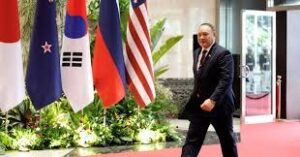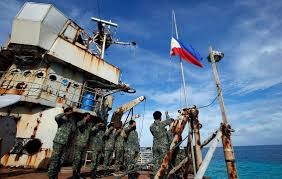MANILA, PHILIPPINES – Philippine Department of National Defense (DND) Secretary Gilberto Teodoro Jr. on Monday, October 20, launched a powerful critique against Chinese President Xi Jinping’s advocacy for a “multipolar world” led by Beijing. Teodoro argued that this vision is a direct ideological counter to the established Western narrative of an international order anchored by the United States, warning that it poses significant risks to smaller nations, especially the Philippines, one of the countries most directly affected by Beijing’s assertive regional policies.
Speaking at the opening ceremony of the month-long meeting of senior officials from the Philippine Air Force, Philippine Navy, Philippine Marines, and Philippine Army at Camp Aguinaldo in Quezon City, Teodoro addressed the intensifying geopolitical contest between the world’s two largest economies.
“The strategic competition between the US and China has intensified in recent years, with geopolitical rivalries hardening and mistrust deepening across oceans and continents,” Teodoro stated. He asserted that China actively employs this geopolitical tension to pressure nations, both politically and militarily, that do not comply with its dictates, specifically naming the Philippines, Australia, and various European countries as targets of this coercive approach.

The Danger of Transactional Diplomacy
Teodoro referenced a past interview with former Finnish President Alexander Stubb to define and critique the concept of multipolarity being promoted by Beijing. He described this multipolar world as one where “nation-states engage on a transactional basis without clear international rules.”
The defense chief warned that an undue focus on great power competition implies that smaller states, such as the Philippines, are merely forced to do the bidding of the so-called major powers—a scenario where “we are treated as pawns with no strategic agency.”
He stressed that such narratives mislead the international community because they serve to “mask the ambition of certain countries to reshape the global governance system for their own advantage, to the detriment of the rest of the world.”
Teodoro pointed out the diplomatic isolation the Philippines currently faces in its firm stance against China’s encroachment in the South China Sea (West Philippine Sea). While other claimants in Southeast Asia—including Vietnam, Indonesia, Malaysia, and Brunei—have largely remained silent, the Philippines stands as the lone Asian nation consistently confronting Beijing. He suggested this silence from neighbors stems from being “held by the neck by China,” given the massive economic benefits derived from their commercial ties with the Asian giant.
Multipolarity vs. Multilateralism
Teodoro directly contrasted China’s preferred “multipolar” model with the established international framework.
“Just last week, President Xi Jinping articulated this mission for a new global order. He urged his counterparts in the Shanghai Cooperation Organization to advocate an equal, orderly multipolar world,” Teodoro noted. “The idea of multipolarity is concerning. This is in contrast to what we know as multilateralism, where nation-states cooperate within a framework of international law and institutions.”
The defense secretary emphasized that a multipolar world, where a country believes it can operate without interference or accountability for its actions, is particularly perilous for smaller, more vulnerable states like the Philippines.
He cited the prime example of China’s assertion of sovereignty over the South China Sea based on the invalidated nine-dash line. This claim was definitively struck down by the 2016 Arbitral Award, which is anchored in the 1982 United Nations Convention on the Law of the Sea (UNCLOS). Despite this ruling, China continues to ignore the judgment, maintaining its naval presence and persistently violating Philippine maritime jurisdiction in the West Philippine Sea.
Illustrating this continued aggression, Teodoro highlighted a recent incident from the previous weekend: “The Philippine Navy was monitoring the presence of Chinese vessels at Ayungin (Second Thomas) Shoal—a key maritime outpost where the BRP Sierra Madre is stationed—105 nautical miles west of Palawan.”
Recommitment to Principles and Expanding Alliances

Given the escalating tensions, Teodoro called on all nations to “recommit to stable principles that ensure strategic stability” and to consistently utilize dialogue and communication to prevent a further rise in tensions.
In stark contrast to the transactional nature of multipolarity, Teodoro stated that the Philippines is actively expanding its network of partnerships with like-minded nations based on shared democratic values and adherence to international law.
He revealed that on the sidelines of the recent Seoul Defense Dialogue, he held crucial meetings with several international counterparts, including South Korean Defense Minister Shin Won-sik, State Secretary to the Swedish Minister for Civil Defence Carl-Oskar Bohlin, and Minister of Defence and Military Veterans of South Africa Thandi Modise.
In these high-level discussions, Teodoro underscored the necessity of closer collaboration with allies and friendly nations to bolster the Philippines’ defense modernization and national resilience efforts. The discussions centered on critical areas such as logistics cooperation, technology transfer, defense industrial collaboration, civil defense, crisis response, capacity building, defense education and training, emerging security technologies, military medicine, and maritime safety.
Secretary Teodoro’s comprehensive address serves as a forceful declaration of the Philippines’ strategic position: rejecting a world order dictated by great power whims and instead advocating for one based on multilateralism, international law, and the sovereign equality of all states.





